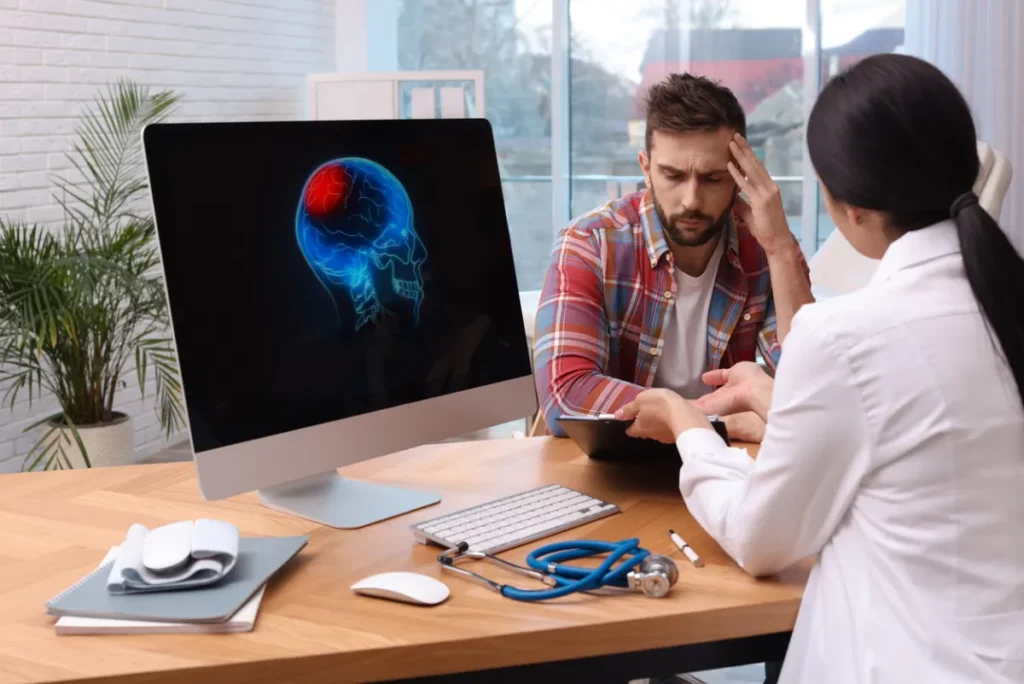
Traumatic brain injuries (TBIs) can be life-altering, affecting every aspect of a person’s life, from physical and cognitive abilities to emotional and financial stability. The injured person often faces significant challenges, including physical and cognitive impairments that impact their quality of life. If you or a loved one has suffered a brain injury due to someone else’s negligence, understanding your legal rights and how to pursue compensation is crucial. In this comprehensive guide, we’ll walk you through the steps involved in filing a claim for traumatic brain injury compensation.
If you’re exploring your options for compensation for traumatic brain injury or need help navigating the brain injury compensation process, it is important to take legal action promptly to protect your rights. Delfino Green & Green has the experience and dedication to help you pursue justice and offers a free consultation for brain injury cases.
Gathering Evidence is The Foundation of Your TBI Claim
Building a successful claim for traumatic brain injury compensation begins with one critical task: gathering and preserving evidence. To support your brain injury case, it is essential to gather evidence that establishes the facts, proves negligence, and identifies the responsible party. Evidence is the bedrock upon which your entire case is built. It’s what allows your attorney to prove that another party’s negligence caused the injury and to demonstrate the full extent of the damages you have suffered. Without strong, credible evidence, even the most legitimate claim can falter.
Key Pieces of Evidence to Collect:
- Accident and Police Reports: If the injury resulted from a car crash, workplace accident, or another incident where law enforcement or an official body responded, their report is a vital piece of evidence. It provides an official, objective account of the incident, often including details about the parties involved, witness information, and initial findings of fault.
- Witness Statements: Eyewitnesses can provide invaluable perspectives on how the accident occurred. Their testimony can corroborate your version of events and help neutralize any attempts by the opposing side to dispute liability. It is crucial to collect the names and contact information of any witnesses at the scene. Your legal team can then follow up to obtain detailed statements while their memories are still fresh.
- Medical Records and Expert Testimony: Your medical records are the primary evidence of your injury. Comprehensive medical documentation is crucial in proving the severity and causation of the injury in a brain injury case. They create a detailed timeline, from the initial emergency room visit to ongoing therapies. These records document every diagnosis, treatment, and medical opinion related to your TBI. To add weight to these records, medical experts, such as neurologists, neuropsychologists, and life care planners, play a crucial role. These experts can provide professional testimony that explains the severity of your brain injury, its impact on your cognitive and physical functions, and the necessity for future medical care.
- Diagnostic Imaging: Tests like Magnetic Resonance Imaging (MRIs), Computed Tomography (CT) scans, and Positron Emission Tomography (PET) scans provide objective, visual proof of the physical damage to the brain. These diagnostic tests are difficult for insurance companies to refute and serve as powerful evidence to support the medical expert’s testimony.
- Physical Evidence: Any physical evidence from the accident scene can be instrumental. This includes photographs and videos of the scene, vehicle damage, property damage, and any hazardous conditions (like a wet floor in a slip-and-fall case) that caused the injury. In today’s world, footage from traffic cameras, security cameras, or even dashcams can capture the critical moments of an incident.
- Personal Journals and Family Testimony: The effects of a TBI are not just physical. Documenting your daily struggles, pain levels, emotional state, and cognitive challenges in a journal can provide a powerful, personal account of your suffering. Testimony from family members about the changes they’ve observed in your personality, abilities, and daily life further illustrates the profound impact of the injury.
Gathering evidence is essential for a successful personal injury claim, as it helps establish liability, supports your brain injury case, and ensures the responsible party is held accountable.
A meticulous and thorough investigation is non-negotiable when pursuing a TBI claim. The legal team at Delfino Green & Green understands that victims are often in no position to gather this evidence themselves. This is where we step in, deploying our resources to conduct a comprehensive investigation to ensure every piece of crucial evidence is secured to build the strongest possible case for you.
Medical Treatment and Records
Consistent and well-documented medical treatment is essential to any successful TBI claim. Ongoing medical treatment is often necessary for TBI victims and should be thoroughly documented to demonstrate the long-term impact of the injury.
Why Medical Records Matter:
- Timeline and Severity: Detailed records help demonstrate the progression and seriousness of the injury.
- Treatment Documentation: Keep a record of all visits to medical professionals, prescribed medications, physical therapy, and hospital stays. Be sure to also document any future medical expenses related to the injury, such as ongoing treatments, medications, therapies, or surgeries that may be required.
- Expert Testimony: Medical professionals can provide insight into the nature of your injury, treatment plans, and long-term outlook.
Even minor head injuries can evolve into significant problems. Continued care and accurate documentation of all related medical expenses, including future medical expenses related to your injury, will serve as strong evidence when determining traumatic brain injury compensation.
A law firm like Delfino Green & Green can help ensure that all medical data is compiled and effectively presented during negotiations or court proceedings.
Future Medical Expenses
Traumatic brain injuries often require long-term or even lifelong care. Compensation should reflect these ongoing needs.
Future costs to consider include:
- Ongoing physical therapy and rehabilitation
- Medications and follow-up appointments
- Home modifications for accessibility
- Lost earning capacity due to disability
- The potential need for specialized medical equipment as part of long-term care for TBI patients
What Future Costs to Consider:
- Rehabilitation Therapy: Includes occupational, speech, or physical therapy.
- Assistive Devices and Home Modifications: Equipment like wheelchairs or home modifications such as ramps and grab bars.
- Continued Medical Appointments: Regular follow-ups with neurologists, psychologists, or other specialists.
- Medication Costs: Chronic conditions may require long-term prescription management.
- Loss of Earning Potential: If the injury limits the victim’s ability to work or advance in their career.
Estimating these costs accurately often requires medical and financial experts. A lawyer will help retain professionals who can provide credible future expense projections to bolster your case and ensure that you receive appropriate compensation for all anticipated needs.
Navigating the Traumatic Brain Injury Compensation Process
Understanding the process to file a TBI claim can help demystify the journey ahead. The process typically begins long before a lawsuit is filed and involves several key stages.
- Initial Consultation with a TBI Lawyer: The first step is to seek legal advice. At Delfino Green & Green, we offer a no-cost case evaluation. During this initial meeting, you can discuss the details of your accident and injury, and our legal team can assess the strength of your case. Consulting with an experienced personal injury attorney or traumatic brain injury lawyer can provide you with valuable insight into your rights and the best strategies for your brain injury claims. This is your opportunity to ask questions and understand your legal options without any financial commitment.
- Case Investigation: If you choose to move forward, your attorney will launch a full investigation. As detailed earlier, this involves gathering all evidence, from accident reports to medical records, and consulting with relevant experts.
- Filing the Claim and Demand Letter: Your lawyer will formally notify the at-fault party’s insurance company that you are seeking compensation by submitting an insurance claim and formally seeking to recover compensation for your injuries. After a period of medical treatment has established a clearer picture of your damages and long-term prognosis, your attorney will compile a comprehensive “demand letter.” This letter outlines the facts of the case, establishes the other party’s liability, details all your damages (medical bills, lost wages, pain and suffering), and demands a specific settlement amount.
- Negotiation with the Insurance Company: The insurance company will respond to the demand letter. Their initial offer is almost always far lower than what you deserve. This begins a period of negotiation. Strong legal representation is crucial in dealing with insurance companies during this stage. An experienced personal injury lawyer is a skilled negotiator who will advocate fiercely on your behalf, countering lowball offers and fighting for a settlement that truly reflects the average TBI compensation for similar cases.
- Filing a Lawsuit: If the insurance company refuses to offer a fair settlement, the next step is to file a personal injury lawsuit. This doesn’t mean your case will necessarily go to trial. The negotiation process continues, but filing a lawsuit shows the insurer you are serious and often prompts a more reasonable offer.
- Litigation and Trial: The vast majority of TBI cases are settled out of court. However, if a fair agreement cannot be reached, your legal team must be prepared to take your case to trial. A brain injury lawsuit payout determined by a jury can sometimes be the only way to achieve true justice.
Throughout this entire process, your attorney acts as your guide, advocate, and protector, handling the legal burdens so you can focus on your recovery. Attorneys can help clients claim compensation, recover compensation for damages, and navigate the complexities of brain injury claims, ensuring your rights are protected every step of the way.
Role of Family Members
When someone suffers a TBI, the effects often ripple through the entire family.
- Family members can help by documenting the injured person’s symptoms, including their physical pain, and the challenges they face day-to-day. This record can be valuable for both medical treatment and legal claims.
How Family Can Help:
- Support During Recovery: Daily care, emotional encouragement, and logistical help.
- Documentation: Family members can help record the injured person’s symptoms, progress, and challenges.
- Testimony: They can provide powerful insight into how the injury has changed the victim’s life.
- Legal Support: In cases where the victim is unable to manage their own claim, family members may need to take legal steps on their behalf, especially when the TBI was caused by someone else’s negligence.
Family members may also have the right to seek compensation for loss of companionship or loss of support, depending on the case.
Diagnostic Tests and Evaluations: Proving the Invisible Injury
One of the greatest challenges in TBI cases is that the injury itself is often invisible. Unlike a broken bone, you can’t always see a brain injury on the surface, especially when it results from head trauma, which can cause significant but hidden damage. This is why objective diagnostic tests and expert evaluations are so critical.
- Imaging Tests (MRI, CT, PET): These medical imaging technologies can reveal physical evidence of brain trauma, such as bleeding, bruising, or structural damage. Imaging can also detect injuries like diffuse axonal injury, axonal injury, and damage to brain tissue, which are often not visible externally. A positive finding on one of these scans provides concrete proof of the injury.
- EEG Testing: Identifies abnormal electrical activity in the brain.
- Functional Assessments: Evaluate how the injury affects daily living and job performance.
- Neuropsychological Evaluations: This is a comprehensive assessment of cognitive and behavioral functioning. A trained neuropsychologist will conduct a series of tests to evaluate memory, attention, problem-solving skills, executive functioning, and TBI symptoms. The results can scientifically document the cognitive deficits caused by the TBI, providing crucial evidence of the injury’s functional impact, which is a cornerstone of the brain injury compensation process.
There are several types of traumatic brain injuries, including concussions, contusions, and diffuse axonal injury. Penetrating injury is another severe form of TBI, occurring when an object breaks through the skull and damages brain tissue.
These evaluations help translate the victim’s subjective experiences, like “brain fog” or memory problems, into objective, data-driven evidence that can be presented as part of the claim.
Common Challenges in TBI Claims
Pursuing compensation for a TBI is rarely straightforward. Traumatic brain injury cases and personal injury cases are often complex, requiring specialized legal and medical expertise to ensure all aspects of the injury are properly addressed. Victims and their families often face significant hurdles put up by insurance companies aiming to minimize their payout.
- Disputing the Severity of the Injury: Insurers frequently try to downplay the severity of a TBI, especially in cases of “mild” TBIs or concussions, where initial imaging scans may be clear. They may argue that the symptoms are exaggerated or unrelated to the accident.
- Proving Negligence: The defense may argue that their client was not at fault or that the victim shared some of the blame for the accident. A thorough investigation is key to overcoming this challenge.
- Insurance Disputes: Insurers may argue that the injury isn’t as severe as claimed or that it’s unrelated to the incident, and may attempt to minimize the brain injury settlement or traumatic brain injury settlement amounts.
- Incomplete Medical Records: Missing documentation can weaken your case significantly.
- Time-Consuming Process: Legal procedures, medical evaluations, and negotiations can stretch on for months or even years.
- The Complexity of the Legal System: The legal process is filled with deadlines, procedural rules, and complex legal standards. Trying to navigate this alone while recovering from a serious injury is a recipe for failure.
Estimating TBI Compensation Amounts
Understanding the possible payout for a brain injury can help set realistic expectations.
- Lost wages: Compensation may include not only wages lost during recovery but also an evaluation of future earning capacity, especially if the injury affects your ability to work long-term.
- Severity of injury: More severe injuries typically result in higher compensation. Severe traumatic brain injuries, in particular, often lead to greater payouts due to permanent disabilities, extensive treatment needs, and long-term impacts on the victim’s life.
- Medical expenses: All past and future medical costs related to the injury are considered.
- Pain and suffering: Non-economic damages for physical pain and emotional distress are also factored in.
Factors That Influence Compensation:
- Severity of Injury: The more severe the TBI, the higher the potential settlement.
- Medical Costs: Both current and anticipated future expenses.
- Lost Wages: Includes time missed from work and reduced earning potential.
- Pain and Suffering: Physical and emotional distress.
- Loss of Enjoyment of Life: Compensation for the inability to participate in normal activities.
While there is no fixed average payout for traumatic brain injury, settlements can range from thousands to millions of dollars, depending on the case. Experienced attorneys can estimate your average TBI compensation and help you pursue the maximum allowable amount.
Take the Next Step with Delfino Green & Green
Facing the aftermath of a traumatic brain injury is one of the most difficult challenges a person can endure. The path to recovery is long, and the financial and emotional burdens can feel insurmountable. You do not have to face this journey alone. Securing just compensation is critical for accessing the best possible care and ensuring your family’s financial stability.
The legal team at Delfino Green & Green has the experience, resources, and compassion to guide you through every step of the TBI claims process. We understand the medicine, we know the law, and we are dedicated to fighting for the rights of injury victims.
If you or a loved one has suffered a traumatic brain injury due to someone else’s negligence, we urge you to take the first step. Contact Delfino Green & Green today for a free, no-obligation consultation. Let us handle the legal complexities so you can focus on what matters most: your health and your family.
Disclaimer: This content is for informational purposes only and does not constitute legal advice. For personalized legal assistance, please contact Delfino Green & Green directly.



